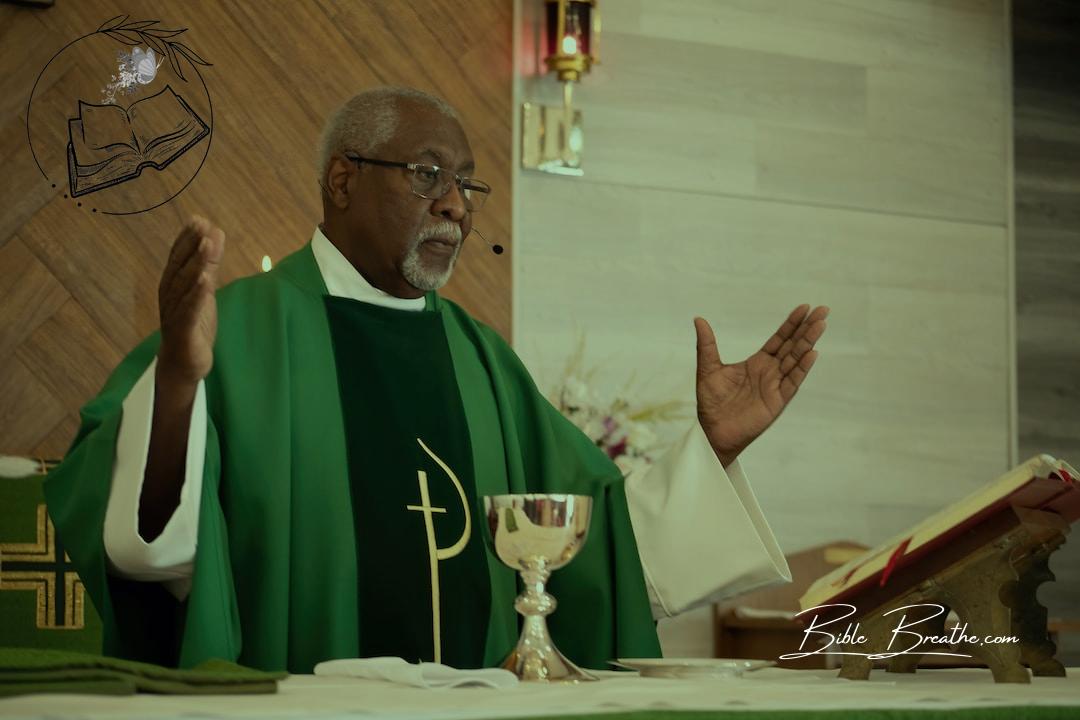Who gets an invite to the communion party according to the Bible?
It’s like setting a table for your close pals at the best restaurant in town.
Communion, also known as the Lord’s Table, is a big deal in the Christian faith, but who’s on the guest list?
Let’s break it down, my friends!
From ancient texts like the Didache to the wisdom of Justin Martyr, communion has seen its share of change, but its core?
That’s all about your spiritual standing.
In 1 Corinthians 11:27, it’s pretty clear: show up with a heart free of unrepentant sin.
This party is for those who’ve had that born-again experience, declaring their faith loud and proud.
It’s your way to say, “I’m with Him!”
🙌
Now, don’t get it twisted – the rules change a bit depending on where you worship.
Some have an “open table,” welcoming all believers, while others want you to be in the church squad and walking the walk.
So, whether you’re at the open-door soirée or the exclusive club, this feast’s all about faith, fam!
🍞🍷
Key Takeaways
-
Communion holds a sacred and profound significance in Christian faith. It commemorates Jesus’ sacrifice on the cross and His instructions to His followers to partake in the bread and wine as symbols of His body and blood. This act represents the spiritual nourishment and unity of believers in Christ.
-
The Bible emphasizes the importance of self-examination and being in right standing with God before taking communion. In 1 Corinthians 11:27-28, it is written, “So then, whoever eats the bread or drinks the cup of the Lord in an unworthy manner will be guilty of sinning against the body and blood of the Lord. Everyone ought to examine themselves before they eat of the bread and drink from the cup.” This underscores the need for a repentant heart and a genuine faith in Christ’s sacrifice.
-
Communion is not limited to specific church denominations but is a universal practice among Christians worldwide. It unites believers across various traditions and backgrounds, symbolizing their common faith in Jesus Christ. The diversity of denominations and practices in Christianity may result in variations in how communion is administered, but the core meaning remains consistent.
-
While the Bible does not prescribe an exact list of qualifications for partaking in communion, it does emphasize the importance of a genuine, repentant faith in Jesus Christ. Ultimately, it is a personal decision and a matter of individual conscience guided by one’s relationship with God and understanding of the significance of communion.
-
In summary, communion is a sacred practice in Christian faith, emphasizing self-examination, right standing with God, and unity among believers. It transcends denominational boundaries and is open to all who have a sincere faith in Jesus Christ, recognizing His sacrifice for the forgiveness of sins.
Who’s Invited to the Communion Table?
Photo modified by BibleBreathe.com. Original photo by Priscilla Du Preez 🇨🇦 on Unsplash
Imagine a grand banquet, not with fancy cuisine, but with profound spiritual significance.
This, my friends, is communion.
It’s like pulling up a chair at the Lord’s table, a moment of deep connection, reflection, and fellowship with our Savior.
But who gets to savor this divine feast?
Early Church Insights
Back in the early days of Christianity, communion was woven into the very fabric of communal worship.
The early church was all about transformation through faith and repentance.
You see, baptism, which symbolizes a spiritual rebirth, often paved the way for partaking in the Lord’s Table.
It was like a spiritual dress code.
If you confessed your faith, repented of your sins, and went through that transformative dip in the waters of baptism, you were on the guest list.
The Didache, an ancient Christian document, made it clear: confess your sins before diving into the feast.
And then there’s Justin Martyr, who stressed that only those who walked in line with Christ’s teachings were fit to partake.
Let’s Dive into Corinthians
Now, if you’re digging for biblical proof, head over to 1 Corinthians 11:27 in the King James Version.
The Apostle Paul lays it out plain and simple:
“If you take this bread and cup without the right attitude, you’re messing with some serious spiritual stuff.” – 1 Corinthians 11:27 (KJV)
Paul’s words serve as a lighthouse, warning us that approaching communion with anything less than genuine faith and a heart committed to Christ’s teachings is a big no-no.
The Lord’s Table is an invitation for those with believing and repentant hearts—a sacred gathering where folks who’ve confessed their faith come together for spiritual nourishment and to reaffirm their devotion to Christ.
It’s all about embracing the incredible bond of love, grace, and unity that our Lord established for us.
So, if that’s you, welcome to the table; it’s a place of grace, love, and spiritual refreshment.
Who Can Partake in Communion According to the Bible
Photo modified by BibleBreathe.com. Original photo by Simon Barber on Unsplash
Communion, often called the Lord’s Supper, is a bit like a family picnic, a sacred feast packed with spiritual significance.
Grasping Communion’s Biblical Meaning
In the book of Corinthians, specifically 1 Corinthians 11:17–34, we uncover precious insights into this cherished Christian tradition.
The Apostle Paul, in his letter, emphasizes the importance of approaching the Lord’s Table with respect and discernment.
It’s not just about nibbling on bread and sipping wine; it’s a spiritual encounter loaded with symbols and meaning.
Paul gives a heartfelt warning against approaching the table unworthily, underlining the significance of self-examination and repentance.
When you step up to the Lord’s Table, it’s not about your status in society or your worldly accomplishments; it’s all about the state of your heart.
“So, if you eat the bread or drink the cup of the Lord in a way that isn’t worthy of it, you sin against the body and blood of the Lord.” – 1 Corinthians 11:27 (KJV)
Embracing Personal Faith in Communion
Communion is a sacred meal for those who’ve embraced Jesus Christ as their personal Savior, for those who’ve experienced a spiritual rebirth.
Think of it as a family dinner—you’re at the table because you’re part of the family.
Just like baptism symbolizes a fresh start in Christ, communion signifies an ongoing connection with the Lord.
It’s a moment to ponder the sacrifice Jesus made for us, a reminder of His unending love and grace.
Before you partake in communion, it’s vital to search your heart, confess any wrongdoing, and reaffirm your faith.
It’s not about belonging to a particular church or following religious rituals; it’s about your personal relationship with God.
“So, each person should examine himself, and then he should eat the bread and drink from the cup.” – 1 Corinthians 11:28 (KJV)
In a nutshell, communion is for believers, for those who’ve welcomed Jesus into their hearts, turned away from their sins, and are committed to following Him.
It’s a symbol of our spiritual condition, our connection with the Lord, and a profound reflection of His love and sacrifice.
The Communion Guest List: Who’s In and Who’s Out?
Photo modified by BibleBreathe.com. Original photo by David Goldman on Unsplash
Imagine a beautifully set table, but not for a typical meal.
This is the Lord’s Table, the heart of the Christian faith, where we symbolically relive Christ’s sacrifice and celebrate our unity as believers.
But, my friends, not everyone gets an invite to this spiritual feast.
The Unawakened and Unrepentant
You see, communion is like a gathering of hearts deeply rooted in a profound belief in Christ’s teachings.
It’s for those who have experienced a spiritual awakening through faith, often symbolized by baptism – a public declaration of an inner transformation.
In the tapestry of faith, if you haven’t had this spiritual awakening, if your heart hasn’t been set on fire by faith, you’re kindly asked to abstain.
And if you’re tangled up in unconfessed sin, well, it’s best to hold off too.
Just as water can’t mix with fire, communion requires hearts ablaze with faith, honesty, and a genuine commitment to living in line with Christ’s teachings.
Navigating the Warning Signs
Now, if you’re wondering where this is all coming from, take a look at 1 Corinthians 11:27 in the King James Version, where the Apostle Paul gives us a serious heads-up:
“If you eat this bread and drink this cup without the right attitude, you’re basically mishandling something sacred.” – 1 Corinthians 11:27 (KJV)
Paul’s words are like a flashing warning sign, reminding us not to approach communion casually.
It’s a vivid warning that coming to the Lord’s Table without a heart aligned with Christ’s teachings is like trying to grab the sun without getting burnt—a mission impossible and risky.
In a nutshell, communion is a sacred act for believers, for those who’ve been reborn in faith and those with repentant hearts.
It’s a communion with the Lord, a bond that grows stronger through faith, baptism, and a life lived in obedience to Christ.
As for those still on the journey to faith or carrying the burden of unrepented sin, the invitation to the Lord’s Table patiently waits, encouraging them to first seek that spiritual awakening and cleansing that turns ordinary bread and wine into a divine connection with our Creator.
Communion: A Universal Feast for Believers
Photo modified by BibleBreathe.com. Original photo by Hannah Busing on Unsplash
Communion, often known as the Lord’s Supper, is a sacred and inclusive practice for all followers of Christ.
It’s like a grand potluck dinner where everyone who believes in Jesus is welcomed, no matter their church tradition.
Communion That Breaks Denominational Barriers
The beauty of communion lies in its inclusivity.
It goes beyond denominational lines and theological distinctions.
It’s a practice designed to bring all believers together under the banner of faith in Jesus Christ.
Think of it as a big family gathering, where diverse members come together at the same table, celebrating their shared faith.
The Apostle Paul, in the Scriptures, emphasized the importance of unity among believers when participating in communion.
It’s about recognizing that we are all part of one spiritual family that extends beyond the walls of any specific church.
“For we being many are one bread, and one body: for we are all partakers of that one bread.” – 1 Corinthians 10:17 (KJV)
The Significance of Communion as the Lord’s Table
Communion is often called the Lord’s Table, a table set by Christ Himself.
It symbolizes His sacrifice and serves as a reminder of His enduring love for humanity.
Each time we partake, it’s like having a heart-to-heart conversation with the Lord, expressing our gratitude and love for Him.
Just as a family gathers around a table at home, the Lord’s Table unites the family of believers worldwide.
It’s a moment of communion not only with the Lord but also with fellow believers around the globe.
“And when he had given thanks, he brake it, and said, Take, eat: this is my body, which is broken for you: this do in remembrance of me.” – 1 Corinthians 11:24 (KJV)
In summary, communion is open to all believers, regardless of their denominational background.
It’s a universal symbol of unity and love among those who have accepted Jesus Christ as their savior.
Just like a family gathering around a table for a meal, believers come together at the Lord’s Table, expressing their gratitude and love for the Lord and one another.
Communion: A Divine Connection with Christ
Photo modified by BibleBreathe.com. Original photo by Luis Morera on Unsplash
Let’s talk about communion, folks, and I’m not referring to just munching on some bread and sipping wine.
This is something deeper, more profound.
It’s like a sacred rendezvous at the Lord’s Table where we connect with Christ on a spiritual level.
A Spiritual Bond: Getting Closer to Christ
Imagine a celestial waltz where the very souls of believers intertwine with the divine essence of Christ.
That’s what communion is all about.
It’s a mystical union, where we, like branches latching onto a sturdy vine, become one with Jesus.
Through our faith, the act of baptism, and an honest declaration of our belief, we forge an unbreakable bond, a spiritual love story with our Savior.
The Story of Life and Rebirth
Now, when we take that bread and sip that wine during communion, it’s like we’re replaying a powerful story – the death and burial of the Son of God.
The bread, a symbol of Christ’s body broken for us, reminds us of the incredible sacrifice made on that cross.
The wine, like the shed blood, represents cleansing and redemption.
Think of it like a seed, seemingly lifeless when it’s buried in the ground, but then it bursts forth as new life.
Communion is a reminder of a similar spiritual reality.
When we partake, we acknowledge Christ’s death, but we also eagerly anticipate our own resurrection to a new, redeemed life.
“Whenever you eat this bread and drink this cup, you are telling others about the Lord’s death until he comes.” – 1 Corinthians 11:26 (KJV)
This verse hits the nail on the head.
Communion is a way to continually affirm our faith, remind ourselves of Christ’s sacrifice, and look forward to the day of His triumphant return.
In a nutshell, communion is like a symbolic dance with Christ, a soulful connection, and a powerful reminder of the incredible love that ties us to our Savior.
It’s not just a ritual; it’s a spiritual journey, a moment where hearts meet across time and space.
Communion: A Heartfelt Confession
Photo modified by BibleBreathe.com. Original photo by Dawn McDonald on Unsplash
Communion in Christianity is like pouring out your heart to a close friend—it’s deep and sacred.
It’s not just a routine; it’s an intimate conversation with the Divine.
Imagine having a heart-to-heart talk with God.
Looking Inward: A Pre-Communion Check
Before taking part in communion, the Bible encourages believers to take a look inside themselves.
It’s akin to doing a quick check before embarking on a journey—a moment to ponder our lives, our deeds, and our connection with God.
“So, each person should examine himself, and then he should eat the bread and drink from the cup.” – 1 Corinthians 11:28 (KJV)
This examination isn’t just about going through the motions.
It’s about digging deep into our intentions.
Are we participating to honor the Lord and remember His sacrifice, or is it just a habitual act lacking meaning?
It’s all about sincerity, truly grasping the significance of the moment.
Dealing with Unforgiven Sin
Just as unresolved issues can strain a relationship, unaddressed sin can taint the beauty of communion.
It’s like bringing a tainted gift to a loved one.
The Bible warns us about the consequences of participating without dealing with our sins.
“So, if you eat the bread or drink the cup of the Lord in a way that isn’t worthy of it, you sin against the body and blood of the Lord.” – 1 Corinthians 11:27 (KJV)
Unforgiven sin disrupts the communion experience, blocking the deep connection and spiritual fellowship intended.
It’s a call to genuine repentance, a cleansing of the heart before approaching the Lord’s Table.
In a nutshell, before sharing in communion, believers are urged to engage in self-reflection, examining their hearts and intentions.
It’s about coming to the Lord’s Table with sincerity and a true desire to honor Him.
Moreover, it’s crucial to address any unresolved sin to fully embrace the importance of this sacred act and maintain the purity of fellowship with the Lord.
Communion: Qualities of Worthy Participants
Photo modified by BibleBreathe.com. Original photo by Patrick Foh on Unsplash
Imagine you’re an eager traveler invited to a lavish banquet.
Well, that’s how it is with communion at the Lord’s Table.
It’s an invitation for the humble and the devoted, those who carry themselves with qualities that match the sacredness of the occasion.
A Heart Adorned: Humility and Obedience
Picture this: a humble traveler approaching a grand feast.
That’s what communion calls for – a humble heart that recognizes its need for the spiritual nourishment it offers.
The first quality you need is humility – a bowing of your soul before the divine, acknowledging your dependence on God’s grace.
And then, there’s obedience.
It’s like tending a garden, where your life aligns with God’s commandments, producing the fruits of righteousness.
Obedience provides the fertile soil where the seeds of faith can grow and thrive.
A Fresh Start: Born Again and Sin-Free
Communion is for those who have undergone a profound transformation – a rebirth of the spirit.
To partake worthily, you must be born again, leaving your old self behind and embracing a new life.
This rebirth signifies turning away from the past, shedding the weight of your mistakes, and stepping into the loving embrace of Christ.
Similarly, when you come to the Lord’s Table, your heart should be free of the burden of unconfessed sin.
Let go of guilt and shadows through genuine repentance, and commit to living in the light of God’s love and forgiveness.
Baptism: The Gateway
Baptism is like the entrance to a majestic castle, opening the way for the worthy.
It’s a profession of faith, a public declaration of your commitment to follow Christ.
Baptism, as a precursor to communion, symbolizes the cleansing and rebirth of your soul – a symbolic initiation into God’s family.
In essence, communion is for those who wear the spiritual garments of humility, obedience, a born-again spirit, and a repentant heart.
The Lord’s Table invites all who carry these qualities, urging them to partake in this sacred communion where the ordinary transforms into the divine.
Frequently Asked Questions (FAQs) About Who Can Take Communion According To The Bible
Is baptism a prerequisite for taking communion?
Baptism is often considered a prerequisite for taking communion, signifying one’s commitment to Christ.
However, practices vary among Christian denominations.
Some require baptism, while others allow communion without it, emphasizing personal faith in Jesus.
What does it mean to take communion in an “unworthy manner”?
Taking communion in an ‘unworthy manner’ means partaking of the Lord’s Supper without proper reverence, self-examination, and recognition of the significance of Christ’s sacrifice.
1 Corinthians 11:27-29 warns against taking communion in a state of unconfessed sin, without discerning the body and blood of Christ.
It emphasizes the need for a repentant and respectful approach to this sacred act.
How does communion relate to salvation?
Communion symbolizes Jesus’ sacrifice and the covenant of salvation.
By partaking in communion, believers remember Christ’s sacrificial death and celebrate the salvation and forgiveness gained through his atonement.
It’s a commemoration of the redemptive work and a reaffirmation of faith in Jesus as the source of salvation.
{
“@context”: “https://schema.org”,
“@type”: “FAQPage”,
“mainEntity”: [
{
“@type”: “Question”,
“name”: “Is baptism a prerequisite for taking communion?”,
“acceptedAnswer”: {
“@type”: “Answer”,
“text”: “Baptism is often considered a prerequisite for taking communion, signifying one’s commitment to Christ. However, practices vary among Christian denominations. Some require baptism, while others allow communion without it, emphasizing personal faith in Jesus.”
}
},
{
“@type”: “Question”,
“name”: “What does it mean to take communion in an “unworthy manner”?”,
“acceptedAnswer”: {
“@type”: “Answer”,
“text”: “Taking communion in an ‘unworthy manner’ means partaking of the Lord’s Supper without proper reverence, self-examination, and recognition of the significance of Christ’s sacrifice. 1 Corinthians 11:27-29 warns against taking communion in a state of unconfessed sin, without discerning the body and blood of Christ. It emphasizes the need for a repentant and respectful approach to this sacred act.”
}
},
{
“@type”: “Question”,
“name”: “How does communion relate to salvation?”,
“acceptedAnswer”: {
“@type”: “Answer”,
“text”: “Communion symbolizes Jesus’ sacrifice and the covenant of salvation. By partaking in communion, believers remember Christ’s sacrificial death and celebrate the salvation and forgiveness gained through his atonement. It’s a commemoration of the redemptive work and a reaffirmation of faith in Jesus as the source of salvation.”
}
}
]
}








